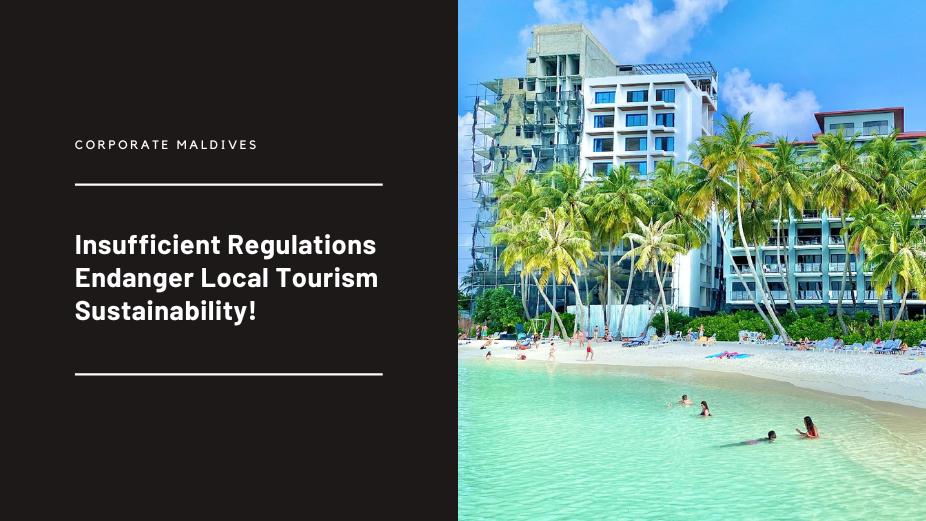
The development of resorts in the Maldives is governed by the government, which determines the bed capacity. The number of rooms and beds is fixed, and any increase requires a permit after careful consideration of the requirements by the government.
However, the situation is different for local tourism. Due to the absence of strong regulations in the development of guesthouses on local islands, various issues arise. The responsibility for governing these islands is left to the councils, resulting in different rules being followed on different islands.
Concerns Highlighted in Dr. Ahmed Solih’s Speech
During the 7th Asia Pacific Broadcasting Union Media Summit held in Maldives, Dr. Ahmed Solih, the State Minister of Tourism, emphasized the relationship between tourism and the environment. He elaborated on the significance of tourism in the country’s economy, the priority given to sustainable tourism in resort development, and the government’s role in determining resort capacity. However, Dr. Solih’s speech also revealed several worrisome aspects.
As an experienced professional in the tourism industry, Dr. Solih explained that every resort in the Maldives is developed only after the government determines its capacity. Factors such as the environmental impact, waste generation, and level of services provided are considered. Dr. Solih expressed concerns about the consequences of exceeding the designated limit, emphasizing the government’s commitment to sustainable tourism rather than haphazardly adding resorts or beds in tourism development.
While Dr. Solih’s comments primarily focused on resorts, it is essential to note that tourism in the Maldives extends beyond resort boundaries. Local tourism, including guesthouses, has become a significant part of the industry. However, there is a lack of government policies regarding local tourism, and the implementation of sustainable resort development policies is also inadequate. Dr. Solih highlighted these concerns during the ABU Summit, emphasizing the need for appropriate actions to address them.
Introduction of Local Tourism in the Maldives
Maafushi Island was among the first to introduce local tourism, which contradicted the government’s sustainable tourism policy. While local tourism brought numerous benefits to Maafushi initially, it is no longer considered a local tourism island. Instead, it has transformed into a tourism hub with towering buildings and guesthouses that offer more tourist beds than a typical resort. City hotels spanning six or seven stories are operating under the guise of guesthouses, expanding their businesses without proper regulations.
This trend is not exclusive to Maafushi but is also observed in other villages across the Maldives. World-class city hotels are being constructed as guesthouses without considering the island’s capacity. Consequently, many islands that once boasted serene and picturesque environments are turning into concrete jungles resembling Male. Although numerous tourist beds are being added to the islands, other necessary developments are not taking place.
Lack of Regulations in Guesthouse Development
While resorts are required to meet various criteria, such as having water and sewerage systems, waste disposal incinerators, and adequate staffing based on bed capacity, guesthouse development lacks such regulations. Guesthouses are being established without essential services and basic infrastructure like water and sewerage systems. In particular, the absence of waste disposal systems has led to the accumulation of waste generated by thousands of tourists, which is devastating the islands’ beautiful mangroves and forests.
As a result, the islands are becoming overcrowded, and their unique culture and customs are gradually disappearing. Crime rates are increasing, and illicit liquor services, prevalent in resorts, are spreading to the villages. Safaris are being brought close to the villages to cater to this demand, as observed in Male and Hulhumale.
The current trajectory of local tourism poses a significant threat to the Maldives’ tourism industry and its islands. Without sustainable tourism practices, there is a high risk of environmental degradation and irreversible damage to the delicate ecosystems and natural beauty that define the Maldives. Additionally, the absence of sustainable tourism practices jeopardizes the long-term viability of the tourism industry, leading to potential economic decline and loss of livelihoods for local communities dependent on tourism-related activities.
Immediate action is crucial to safeguard the environment, preserve the unique charm of the islands, and ensure a sustainable future for the Maldives’ tourism sector.











